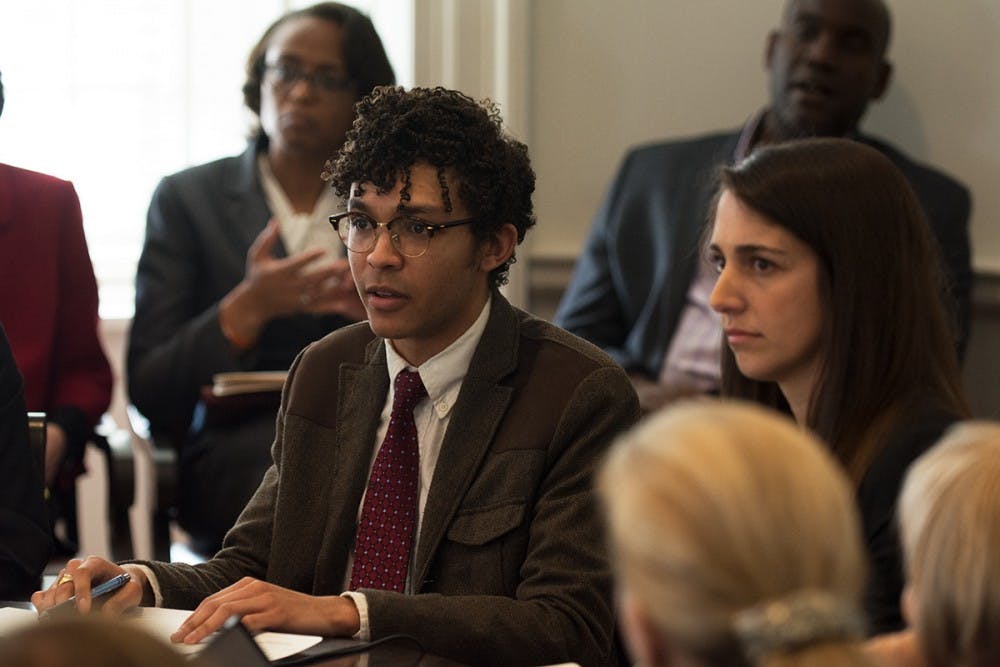The Board of Visitors Academic and Student Life Committee met in the Rotunda last Friday to hear a presentation on the Honor Audit Commission report. The report included survey work that found, among other things, that most faculty respondents think other professors often decline to formally report student honor offenses and instead handle such matters themselves .
In August 2016, the student-run Honor Committee created the Honor Audit Commission to evaluate the honor system at the University. This was the first audit since 2001. The process of the audit included a historical analysis, a comparison of 24 peer schools — 18 of which have an honor code — and a survey of nearly 700 University students and faculty.
Phoebe Willis, chair of the Honor Audit Commission, a Law and Darden student and a former student member of the Board, split the findings into three main areas — community of trust, representation and faculty support.
In the survey, faculty and students were asked if they agreed with the statement, "The Honor System is essential to upholding a community of trust" — a statement with which 84 percent of student respondents and 74 percent of faculty respondents strongly agreed or agreed. People who answered the surveys had to rate several statements rather than answer direct questions in the survey.
“Those numbers at first look really exciting, except … the honor system is seen as the sole overseer of the community of trust,” Willis said. “The community of trust is broader than the honor system, it is broader than the single sanction. It extends to UJC, it extends to Greek Life governing bodies, it extends to sexual assault at U.Va. … So we suggested partnering with other organizations around Grounds to counter the idea that the community of trust was only about honor.”
Devin Rossin, a fourth-year College student and current chair of the Honor Committee, also said it is important to expand the University community’s conception of honor and community of trust.
“Honor extends far beyond not lying, cheating and stealing,” Rossin said. “We stand for the ideals of tolerance, inclusivity and diversity.”
The survey also revealed that 75 percent of faculty respondents strongly agreed or agreed that “[Other] professors often refuse to report students to Honor and, instead, handle the matter themselves.”
“Part of our solution was to meet with faculty in their office to discuss honor,” Willis said. “A one-on-one setting gives faculty a touch person here, who they can have a conversation with about what is honor? What does it mean? We also talked about ways to better engage the faculty, whilst still maintaining the student run nature of the committee.”
University President Teresa Sullivan said the honor code was the best example of student self governance at the University.
“I think that is a widespread belief that students are not sufficiently mature to take on responsibility of being a juror for their peers and yet these very same students can go and be called on to be in juries downtown in Charlottesville,” Sullivan said. “So we have recognized them as being truly adults and that is currently counter-cultural.”
In addition to discussing the findings from the Honor Audit Commission, the committee also heard presentations from the academic dashboard — a compilation of data collected about University students and faculty.
Thomas Katsouleas, University executive vice president and provost, selected 11 different metrics to track the quality of the faculty, students and student experience in 2017 for the report on the overall status of academics at the University. The findings demonstrated growth in research funding in whole dollars and scholarly productivity. However, Katsouleas said there was ample room for improvement.
In regards to the quality of life for students at the University examined under Katsouleas’s report, the Board members discussed whether not informing students who applied regular decision of their acceptance until late March was deterring any students.
“The topic is how do we get the best students?” Katsouleas said. “That might be the really broad question [Dean of Admissions Greg Roberts] could come in and talk to us about. Are we getting the students we want and how do we increase this? Is the calendar a factor in that? We’ll do some detective work and see if we can answer that question.”
Katsouleas said more data analysis will be conducted, and they will address these questions in the Board’s June meetings.
Athletics Director Carla Williams also delivered a report to the Board focused on her plans for continued student-athlete development. Williams discussed increasing academic achievement for student-athletes, creating more leadership opportunities, career engagement via mentoring with faculty and alumni and encouraging student-athletes to be more involved in community engagement.
Williams discussed expanding on existing programs to further enhance student-athletes’ experience at the University.
“But if we really commit to this — based on the reputation of the University, the quality of our faculty members, the talent of our students — I really believe we would create a model for the rest of the country,” Williams said. “This could be the best program in the country for student development, student engagement working with faculty and alums. It’s something that we are very passionate about … and it’s the right thing to do.”
At the end of the meeting, committee chair Barbara Fried recognized Bryanna Miller — a fourth-year College student and the current student member of the Board — for her service to the body. The student member of the Board of Visitors is a non-voting member appointed by the rest of the board to represent the interests of the student body. All the Board members gave her a standing ovation. Miller will be replaced by third-year College student Brendan Nigro June 1.
“It is resolved that the board of visitors thanks Bryanna Miller for her devoted service to the board and University,” Fried said. “[The Board] values her friendship as an esteemed colleague and wishes her great success and happiness in all of her future endeavours.”







